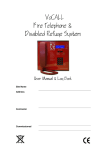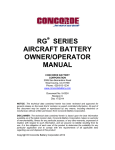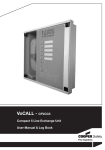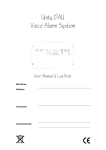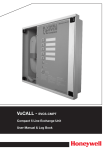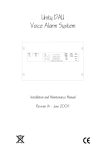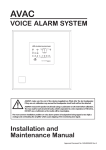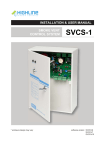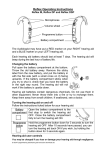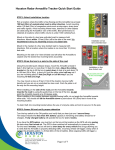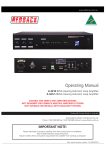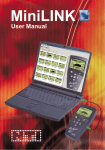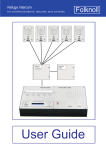Download LX 228 User
Transcript
Lexicomm ViLX-228 EVCS Master Station User Manual, Certificates and Log Book Version 1.0 November 2014 Site Name Address Contractor Commissioned Table of Contents 1. Introduction............................................................................................................................... 3 1.1 What is an Emergency Voice Communication System .............................................................. 3 1.2 Suitability ............................................................................................................................ 3 2. Product Overview ....................................................................................................................... 3 3. Important Safety Information ...................................................................................................... 4 3.1 Battery Information .............................................................................................................. 4 4. Operation .................................................................................................................................. 5 4.1 Receiving a call .................................................................................................................... 5 4.2 Making a call ....................................................................................................................... 5 4.3 Ending a call ........................................................................................................................ 5 4.4 Putting a call on hold ............................................................................................................ 5 4.5 Conference Call .................................................................................................................... 5 4.6 Acknowledging “Assist Call” alarms ........................................................................................ 5 4.7 Accepting Faults................................................................................................................... 5 4.8 Panel Indicator Test ............................................................................................................. 5 5. Indications and Controls ............................................................................................................. 6 5.1 Mode Indicator Summary ...................................................................................................... 6 5.2 Power supply and CPU indicator Summary.............................................................................. 6 5.3 Zone indicator summary ....................................................................................................... 7 6. Maintenance .............................................................................................................................. 7 7. Certificate .................................................................................................................................. 8 8. Site Specific Information: ............................................................................................................ 9 Responsible Person .................................................................................................................... 9 Equipment Locations .................................................................................................................. 9 Log Book Page 1 .......................................................................................................................... 10 Log Book Page __ ........................................................................................................................ 11 Technical Specification ................................................................................................................. 12 Document PViLX228 7004-01 Rev 1.0 2014 Page 2 of 12 1. Introduction 1.1 What is an Emergency Voice Communication System An Emergency Voice Communication System, or EVCS, is a system that allows voice communication in either direction between a central control point and a number of other points throughout a building or building complex, particularly in a fire emergency situation. The control points, or outstations by which they are more commonly referred, generally comprise of a Type A outstation, a Type B outstation, or a Type C Combined Type outstation. “Assist Call” emergency assistance alarm systems can also be incorporated into the EVCS. EVCS is generally required in the following situations: • • • In any building or sports or similar venue where there are disabled people, or people who may have difficulty negotiating the evacuation route. In buildings with phased evacuation and/or firefighting lifts where it facilitates secure communications for building managers, fire wardens, and attending fire officers. At sports venues and similar complexes, where it will assist stewards in controlling the evacuation of the area in an emergency. The Lexicomm ViLX-228 Emergency Voice Communications System (EVCS) is designed to fully comply with BS5839 Part 9:2011 for use as a Fire Telephone system, Disabled Refuge Call system or as a combined system when both Fire Telephones and Disabled Refuge Points are required. 1.2 Suitability Fire telephone systems are recommended for all public buildings and multi-story buildings over four floors by BS9999. Disabled Refuge systems are required in buildings where the public or disabled staff gains access to any floor other than the ground floor using lifts. Refuge areas are provided at each storey exit from each protected stairway. 2. Product Overview The Lexicomm EVCS, or ViLX-228, comprises of a Master Station and one or more outstations. Additionally the “Assist Call” emergency assistance alarm system can either be connected to the same line as an outstation, or connected to a dedicated line. As each line is powered from the Master Station, the outstations and the “Assist Call” emergency alarm system do not require a separate power supply unit. This has the additional benefit of each line being fully monitored and battery backed up. Each ViLX-228 Master Station can also perform as a ViLX-228 Repeater Station. A ViLX-228 Repeater Station mimics the ViLX-228 Master Station both in operation and indication. Any reference in this document to the ViLX-228 Master Station also applies to the ViLX-228 Repeater Station, unless specified otherwise. The ViLX-228 Master Station has been designed for radial star topology. In most cases this will reduce the cable requirements for all ring-based systems. The topology consists of spurs formed of 1 off two core 1.5mm CSA cables (soft skin enhanced up to 1000m per leg, MICC 200m per leg) to each outstation. Page 3 of 12 Document PViLX228 7004-01 Rev 1.0 2014 3. Important Safety Information This Equipment must only be installed and maintained by a suitably skilled and competent person. This Equipment is defined as Class 1 in EN60065 (Low Voltage Directive) and must be EARTHED. Caution Warning Warning Warning Warning Indoor Use Only Shock HazardIsolate Before Opening TO REDUCE THE RISK OF FIRE OR ELECTRIC SHOCK, DO NOT EXPOSE THIS UNIT TO RAIN OR MOISTURE THIS UNIT MUST BE EARTHED NO USER SERVICEABLE PARTS Each ViLX-228 Master/Repeater Station requires a 3A spur, returning to a breaker clearly marked “EVCS DO NOT TURN OFF”. If the ViLX-228 Master Station and the ViLX-228 Repeater Station are distributed around a site, it is essential that both ViLX-228 Stations are on the same mains phase, as they are classified TEN 230V. Powering from different phases can mean a 440V potential can be present in a ViLX-228 Station during a major fault incident. Anti-static handling guidelines Make sure that electrostatic handling precautions are taken immediately before handling PCBs and other static sensitive components. Before handling any static-sensitive items, operators should get rid of any electrostatic charge by touching a sound safety earth. Always handle PCBs by their sides and avoid touching any components. 3.1 Battery Information In the event of mains failure BS5839 Part 9:2011 requires battery backup for 24 hours standby and 3 hours operation thereafter. A ViLX-228 Master/Repeater Station requires one number 12V 7AH vent regulated sealed lead acid battery. The battery is not supplied with the ViLX-228 Master/Repeater Station. Safety Information: Sealed Lead Acid batteries contain sulphuric acid which can cause burns if exposed to the skin. The low internal resistance of these batteries means large currents will flow if they are accidentally short circuited causing burns and a risk of fire. Exercise caution when handling batteries. Power Up Procedure: Always apply mains power before connecting batteries. When connecting batteries, always connect the Positive (Red +) terminal first. Power Down Procedure Disconnect the batteries before removing the mains power. When disconnecting batteries, always remove the Negative (Black –) terminal first. Document PViLX228 7004-01 Rev 1.0 2014 Page 4 of 12 4. Operation All conversations are under the command of the ViLX-228 Master Station. 4.1 Receiving a call One of the eight zone LEDs will flash red to indicate an incoming call. The flash rate will identify the outstation type, with a Type A outstation having a faster flash rate than a Type B outstation. Lift the Master handset receiver. Press the corresponding zone button (indicated by the red flashing LED). This LED will change to flashing green to show that this line is now connected, and a conversation can take place. 4.2 Making a call To make a call, lift the Master handset receiver. Press the zone button for the required outstation. The LED for this zone will flash red. This flash rate will be slower than the flash rate for either an incoming Type A or Type B call. When the outstation answers the call, the zone LED will flash green to indicate this line is now connected and a conversation can take place. 4.3 Ending a call To end the call from the outstation, either replace the Type A receiver back on its hook, or press the call/cancel button for a Type B outstation. To end a conversation from the ViLX-228 Master Station, replace the Master handset receiver back on its hook. Note: This will not end the call, only the conversation. The outstation will revert back to requesting a call, and the zone LED will flash red to indicate this. The call MUST be ended at the outstation. 4.4 Putting a call on hold To put a call on hold, press the zone button for the required outstation that is already connected. The zone LED will change from flashing green to flashing green/red. The hold tone will be heard in the handset. To reconnect the call, press the zone button for the required outstation again. The zone LED will change from flashing green/red to flashing green to indicate the call is now connected again. 4.5 Conference Call Depending upon the number of Line Cards fitted in the ViLX-228 Master Station, up to eight lines can be connected to the conference call. See 4.1 for receiving a call, and 4.2 for making a call to each individual outstation. The ViLX-228 Master Station controls which lines are involved in the conference, and only one conference group is allowed. 4.6 Acknowledging “Assist Call” alarms When an “Assist Call” goes into alarm, the appropriate zone LED will flash blue, and a two-tone buzzer sounds to indicate that an “Assist Call” alarm has been operated. To acknowledge the alarm, press the corresponding zone button, and the blue LED will illuminate continuously with an intermittent buzzer tone every 15 seconds. If after 2 minutes the “Assist Call” alarm has not been cancelled, the buzzer will resound and the LED will flash blue. 4.7 Accepting Faults Before accepting faults, the fault must be noted in the log book, along with the time the fault was reported. To accept the fault, enter either the access level 2 (code: 1664) or access level 3 (code: 1812) menu, then press zone button 1. The buzzer will silence and the general fault LED will now go steady. Press zone button 8 to exit this menu and to return to the menu options. The buzzer will resound on each new fault. 4.8 Panel Indicator Test To test the panel indicators, enter either the access level 2 (code: 1664) or access level 3 (code: 1812) menu, then press zone button 2. All LEDs will illuminate in a predefined sequence, and the buzzer will sound. Press zone button 8 to stop the panel indicator test and to return to the menu options. Page 5 of 12 Document PViLX228 7004-01 Rev 1.0 2014 5. Indications and Controls 5.1 Mode Indicator Summary Mode Green solid Red solid Blue solid Description Normal state Outstation off hook Assist call active 5.2 Power supply and CPU indicator Summary AC x DC PSU CPU x x Flash Flash = LED illuminated x = LED off Description Mains OK Mains failure Battery OK Battery open circuit Battery short circuit Battery high impedance PSU processor fail Document PViLX228 7004-01 Rev 1.0 2014 Page 6 of 12 5.3 Zone indicator summary Zone Indicator Status Slow flash red Fast flash red Normal flash red Normal flash green User Indicator Status Normal flash green Buzzer Status Off Off Off Off On Description Outgoing call Incoming call from type A outstation Incoming call from type B outstation Call connected to local master handset Call on hold Call connected via a remote master handset Line Short circuited Normal flash green/red Normal flash green/white Normal flash green/red Solid White Off Off On Master handset short circuited Slow flash yellow On Line card missing Normal flash yellow On Line Open circuit or EOL missing On Master handset open circuit or EOL missing Line Earth fault Solid yellow Solid Yellow Normal flash yellow Fast flash yellow Solid cyan Solid magenta On Solid cyan Solid magenta Solid white Off Off Off Solid red Off Access level 2 Access level 3 Call accepted from remote master, local master locked Master handset off hook Normal flash blue 2 Tone Alarm Incoming Assist Call alarm Solid blue Intermittent double Beep Assist call acknowledged 6. Maintenance It is a requirement of BS 5839-9:2011 that a maintenance agreement be in place for the EVCS. The maintenance schedule should be as follows: Frequency Test Weekly Test a different outstation on the system each week and make a call to the control. Repeat each week until all outstations and master stations are tested. Record these results in the site log. *if more than one master station is present alternate weekly. Biannually Engineer call to check system operation, intelligibility, field strength of attached AFILS equipment and check battery health. Record results and any variations into the site Log Book Yearly Engineer call to check system operation perform 100% outstation and master station operation, field strength of attached AFILS equipment and check battery health. Record results and any variations into the site Log Book In addition to Yearly tests replace all batteries and record in Log Book. 5 Yearly Page 7 of 12 Document PViLX228 7004-01 Rev 1.0 2014 7. Certificate Combined Certificate for Design Installation and Commissioning for an Emergency Voice Communication System (EVCS) to BS5839 part 9 (2011) Site Name Address Customer Address Areas Covered System Design: In accordance with section 1 of BS 5839 : Part 9 : 2011 sub clause 6 the system design is has in accordance with the recommendations of this code except for the following: Installation: In accordance with section 3 of BS 5839 : Part 9 : 2011, the wiring has been inspected and tested and been found to be in accordance with the recommendations of this code except for the following: Commissioning: In accordance with Section 4 of BS 5839 : Part 9 : 2011: sub clause 21.2C 1. Intelligible conversation is heard at all locations. 2. All controls and indicators operate correctly Acceptance: The system is accepted in good working order and, in accordance with BS5839: Part 9, 2011, record drawings, operating instructions and a system log book have been supplied and received. Attention has been drawn to the recommendations concerning user's responsibilities, particularly those concerned with routine attention and test procedures in section 5, and an appointed responsible person should be nominated by the customer in accordance with the recommendations of Section 6 of BS5839 : Part 9 : 2011. Engineer Date Position Signature: Document PViLX228 7004-01 Rev 1.0 2014 Page 8 of 12 8. Site Specific Information: Responsible Person Date Position Signature: Equipment Locations ViLX228 Location ________________________________________ Cable ID Line Area Served 1 2 3 4 5 6 7 8 Page 9 of 12 Document PViLX228 7004-01 Rev 1.0 2014 Log Book Page 1 Date Event or Work Done Engineer Company Signature Lexicomm System commissioned Document PViLX228 7004-01 Rev 1.0 2014 Page 10 of 12 Log Book Page __ Date Event or Work Done Engineer Company Signature Copy this page as many times as required Page 11 of 12 Document PViLX228 7004-01 Rev 1.0 2014 Technical Specification Product Code Power Supply and Charger AC Input Internal power supply Supply and battery Protection Temperature compensation Battery information Mains fuse Battery fuse Max charge current Inputs Number of lines Remote enable End of line monitoring Relay outputs Number and type Controls Number and type Indication Number and type Enclosure Details Back box finish Dimensions Entries Flush Cutout ViLX-228 230Vac+- 10% 50/60Hz 12Vdc nominal Monitored open, Short, Fuses Deep discharge, Short, Thermals Yes Space for Up to 1x 12V 7AH VRSLA 1A HRC(T) Self Resetting PTC 500mA Between 2 and 8 Short to use 10KΩ 0.6watt resistor 2: Fault and In use, volt free 30Vdc 1A 8 push button zone keys 8x RGB Line indicators 3x PSU Status Indicators 1 x CPU Fault Indicators 1x General Fault Indicator 1x RGB Mode Indicator 1x User Status Indicator RAL 7035 Grey 350 x 300 x 90 14 knockouts top, 2x rear slots 352 x 302 x 80 deep The Lexicomm ViLX-228 EVCS is designed and manufactured in the UK by: Vox Ignis Ltd, Unit 72T Wearfield Enterprise Park East, Sunderland, SR5 2TH. www.vox-ignis.com [email protected] WEEE Compliant Product Document PViLX228 7004-01 Rev 1.0 2014 Page 12 of 12












